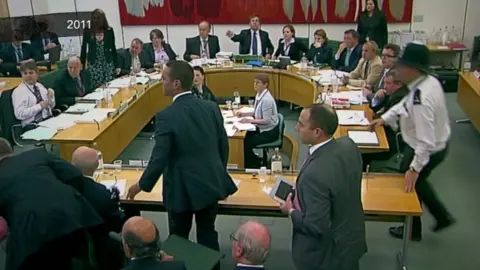Westminster bullying: 'MPs must not discipline one another'
 BBC
BBCMPs cannot be allowed to have a role in disciplining MPs for bullying or harassment of parliamentary staff, a serving clerk of the House of Commons has told Newsnight
Emily Commander triggered a formal investigation into an MP's conduct in 2012 - the only clerk to ever do so.
Ms Commander, who is currently on a career break from the House, raised a complaint against Paul Farrelly MP for bullying in 2012.
Mr Farrelly has denied the allegations.
Asked in an exclusive interview with Newsnight whether she would support MPs continuing to have a role in either investigating or sanctioning other members, Ms Commander said: "I wouldn't because of what happened to me."
Her case was one of the cases examined in Newsnight's in-depth investigation into Westminster bullying and harassment. In her case, her complaint was upheld by an investigation undertaken by a member of House staff. But a final decision on what to do was taken by the House of Commons Commission, then a panel of MPs.
Ms Commander, who now holds the senior rank of deputy principal clerk, said: "Before I made my complaint I would have trusted MPs to remedy the situation... But seeing the months that it took with no resolution at the end - no."
"I think something that was an HR problem became political really quickly. It became about preserving a committee's reputation, preserving a party's reputation, ensuring a committee's findings weren't compromised. There were all sorts of political reasons why it was difficult to deal with."
Her case took place under an HR policy that existed from 2011 to 2013 - the first version of the so-called "Respect" policy. After her case, the system was reformed.
Since 2014, a new role has been in place. MPs are still involved, however. They make up half of the Standards Committee, which decides on sanctions for MPs. It is also now much harder to trigger an inquiry. No complaint from a staff member has reached that level since Ms Commander's case was closed in 2013.
A waste of time
At the time she made her complaint, Ms Commander was clerk of the Culture, Media and Sport Committee. That committee was very high-profile at the time, because it was dealing with the inquiry into phone-hacking. She was the clerk in charge of the committee's administration when Rupert Murdoch was a witness before them - and was attacked with a foam pie.
Ms Commander said she was forced into a complaint because she was unable to keep going. "What happened was that one day I started crying in my office... I felt it wasn't sensible for me to be there with a staff team, with their manager in tears."
She continued: "I do really regret making the complaint. At the time I didn't feel that I had any other option because I was finding it difficult to carry on doing my job in the conditions that I was having to do it. And that was the only solution I could find. But it was such a long and drawn out process with so little to say for it at the end of it that I wish I hadn't done it"
"I spent my whole career idealising the institution I worked for and thinking that the people above me in my management structure could do anything. They were superheroes - geeky ones - but superheroes."
She continued: "But it was a profound moment of disillusionment to discover that for all their effort on my behalf and for all my effort, nobody was able to do anything even so simple as elicit an apology in the first instance. Just a simple apology and an attempt to set things back on the right track." Managers did not have had the power to take action against MPs.
As a consequence of Newsnight's investigation, the House of Commons management has accepted that it needs new processes for bullying and harassment. Ms Commander supported calls for a new disciplinary process to be run independently of the House management or MPs.
The House of Commons Commission has also announced an inquiry into bullying and harassment of staff by MPs. Ms Commander supported calls for this inquiry to take up old cases. She also stated that if the inquiry identified problematic MPs, their names should be given - at the least - to the House of Commons Commission.
 UK Parliament
UK ParliamentA constitutional problem
Ms Commander also raised another concern with Newsnight: clerks have little capacity to defend themselves using conventional employment law because of an important principle of the British constitution - so-called "parliamentary privilege". This is a principle which ensures that the business of parliament cannot be impeded by either private action in the courts or an overbearing monarch.
Ms Commander, who strongly supports the idea of privilege, said that it is a "set of rules that are there exist to protect freedom of speech within parliament so that people can speak without fear of being taken to court or losing their jobs." The simple idea is that courts cannot examine the business of parliament.
But, she explained: "a lot of the things that might happen to clerks will happen during the course of formal proceedings...and because of parliamentary privilege they can't be used as evidence in a court of law." So protections designed to shield MPs from overbearing courts also mean that clerks might not be able to present evidence about the behaviour of MPs, if the MPs misbehave in the course of conducting parliamentary business.
One of the clerks' roles is to protect privilege - and prevent parliamentarians crossing into the domain of the courts. Ms Commander said she "wouldn't have contemplated" going to a tribunal. "For me as clerk, [it is] a terrible red light. There are rules about it, you just wouldn't do it. It's the most basic thing."
When Ms Commander's case was considered by the House of Commons Commission, the commission opted to turn itself into a committee of the house - the so-called "Members Estimate Committee". The only effect of this decision was to make sure that privilege applied to them. If there had been a subsequent employment law case, their work could not have been considered by a court.
